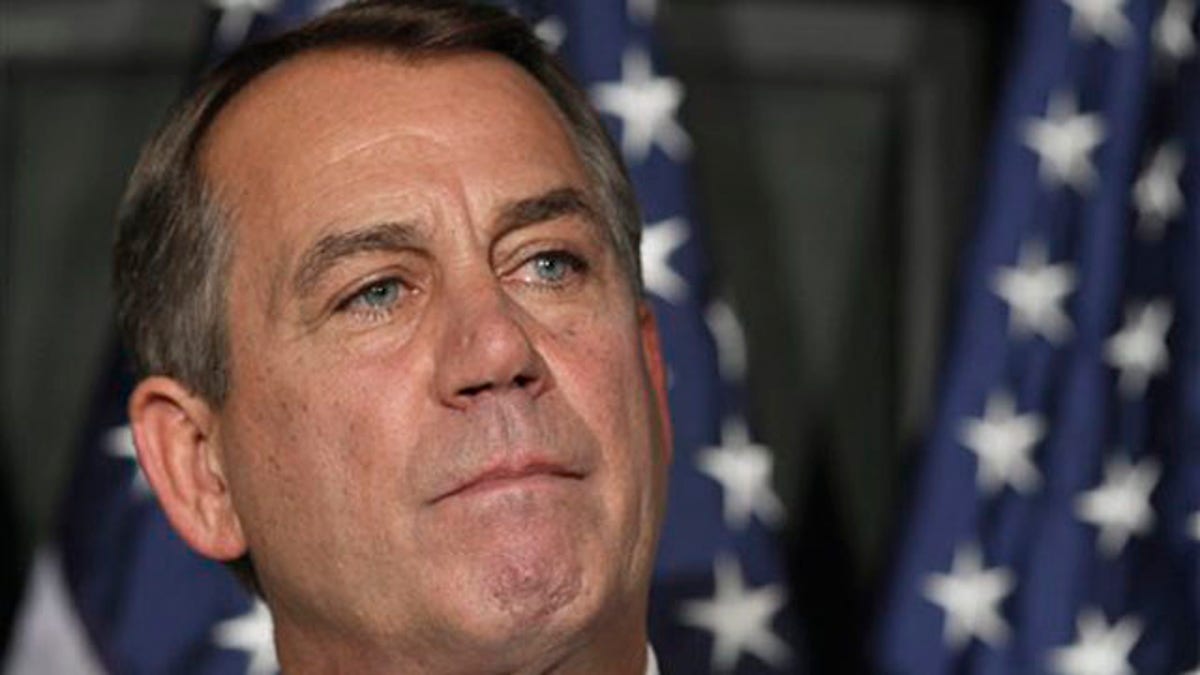
House Speaker John Boehner pauses during a news conference at The Republican National Committee on Capitol Hill in Washington July 26. (AP)
The Obama administration stressed Wednesday that it has not received extra revenue from tax receipts to pay all its bills after Aug. 2, warning that Congress will risk "dangerous" consequences if it does not raise the debt ceiling within a week.
As lawmakers remained split over how to address the problem, the Treasury Department reaffirmed that the country "will exhaust borrowing authority" on Aug. 2. Following suggestions that tax receipts might have been high enough to push back the deadline, Treasury said revenue over the past couple months was "as expected."
"After that date there is no way to guarantee we will be able to meet all of the nation's obligations," the department said.
"This is real and dangerous," White House Press Secretary Jay Carney said.
In the face of potential default, Republicans and Democrats continued to prepare separate bills aimed at reducing the deficit in exchange for the debt-ceiling hike. Each bill faces high partisan hurdles, but Republicans indicated that House Speaker John Boehner's package might be getting back on track after it ran into problems Tuesday evening.
Conservatives balked at Boehner's proposal on Tuesday, saying it didn't go far enough to cut the deficit and ensure a balanced budget in the future. Adding to Boehner's problems, the Congressional Budget Office estimated his bill would only cut deficits by $850 billion over the next decade, not the $1.2 trillion he originally promised.
Boehner vowed to tweak the package to extract more savings, and the tide appeared to be shifting in his favor Wednesday. One aide close to the process said "it's looking really, really good."
Rep. Pete Roskam, R-Ill, chief deputy whip, said he thinks Republicans will have the votes "when push comes to shove." Rep. Allen West, R-Fla., also suggested conservatives were coming around to the revised proposal.
"We're moving in his direction in a big way today," Rep. Mike Rogers said of Boehner's plan. Rogers and others cited changes being made in the bill to make sure spending cuts exceed added borrowing authority, and the fact that the House will soon vote on a balanced-budget plan.
Senate Republican Leader Mitch McConnell said only Boehner's plan would resolve the crisis "in a way that will allow us to avoid default without raising taxes and to cut spending budget gimmicks."
But Senate Majority Leader Harry Reid said the speaker's plan would not get one Democratic vote in the Senate, dooming it to failure. He dismissed it as "a big wet kiss for the right wing," and said it was a short-term measure that would leave the economy on shaking footing.
"It's not Democrats who have asked for a long-term solution," Reid said. "It's the economy. The economy has demanded it."
Backdoor discussions continued amid the standoff. President Obama's budget director, Jack Lew, was seen in Reid's office Wednesday afternoon. GOP Rep. Paul Ryan was also in a meeting on the Senate side.
In the Senate, Reid's plan faced its own challenges.
The Budget Office reported Wednesday morning that the plan in the Senate would save $2.2 trillion over a decade, less than the $2.7 trillion promised. When projected savings from winding down the wars in Iraq and Afghanistan are taken out, the CBO said it would save $840 billion in non-war spending by government agencies and reduce interest payments by $375 billion over a decade.
In total, that's more than Boehner's plan would achieve -- but Boehner's plan also calls for another $1.8 trillion in deficit reduction to be approved before a second debt ceiling hike next year.
Without an infusion of borrowed money, the government faces an unprecedented default on U.S. loans and obligations like $23 billion worth of Social Security pension payments to retirees due on Aug. 3. Congressional telephones and email servers were jammed after Obama urged the public to contact their representatives in his Monday night address to the nation.
The threatened downgrade by credit monitoring agencies of the United States' gold-plated AAA rating absent a solution to the U.S. debt and borrowing crisis is predicted to add at least $100 billion in interest payments to the already ballooning American debt. That would raise interest rates for Americans seeking home mortgages and auto loans and force up the cost of credit card debt. Obama has called that a silent tax increase, something the Republicans have refused to accept when Democrats have sought increased government revenue to stem the crisis.
While Boehner searched for votes in favor of his plan among House Republicans, some Americans seemed to edge closer to the notion that the Aug. 2 deadline might pass without a solution. The U.S. stock market fell again Tuesday, although not dramatically. California planned to borrow about $5 billion from private investors as a hedge against a possible federal government default.
The Associated Press contributed to this report.




